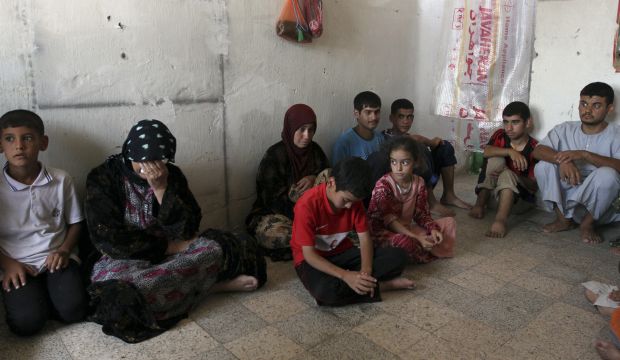
Shi’ite Turkmen families, who have fled the violence in Mosul, gather at a Shi’ite mosque in the town of Nahrawan, east of Baghdad, July 16, 2014. (REUTERS/Mahmoud Raouf Mahmoud)
Khedr Doumli, a Yezidi researcher and expert on minority affairs in the region, told Asharq Al-Awsat on Wednesday that residents of Mosul have faced a number of difficulties since the Islamic State of Iraq and Syria (ISIS) took control.
The Al-Qaeda-inspired ISIS launched a surprise attack on Mosul on June 10, driving government forces out of the city, and has since overrun much territory in northern and western Iraq alongside a wider rebellion against Iraq’s central government.
Doumli said the descruction included the loss of life and funds, the destruction of “nine ancient shrines, seminaries, churches and archaeological sites,” the payment of ransoms “that have reached around 2 million dollars,” mass emigration and attacks on minority areas including “plundering funds and property in more than 11 Shabaki villages.”
The Shabak people are an ethno-religious group who live mainly in villages in the Sinjar district in Nineveh province in northern Iraq.
“More than 45 people have gone missing in Shabaki villages in eastern Mosul. Over 30 Shabakis have been killed during the security collapse in the city. Two days ago, 10 others who had been kidnapped were killed,” Doumli said.
Ghazwan Hamid, a Shabaki member of the Nineveh provincial government, told Asharq Al-Awsat that Shabakis and other minorities around Mosul were the victims of what he called “genocidal campaigns” against them.
Hamid said ISIS had taken control of 11 Shabaki villages when Iraqi troops pulled out.
“They [ISIS] have taken the lives of a large number of Shabakis, destroyed and plundered their property, and even confiscated their cattle, slaughtered them and distributed them to the people,” he said.
Hamid accused ISIS of kidnapping Shabakis in an attempt to gain leverage in talks with Baghdad, saying the organization was trying to negotiate a deal in which it would “set free kidnapped Shabak people in return for some militants held in [government] prisons.”
Shi’ite Turkmen and Yazidis had also been the target of attacks.
Doumli said: “A total of 13 Yezidis have been killed, and more than 38 others were kidnapped, but 24 of them were set free after the payment of ransom.”
He added: “A total of 51 Shi’ite Turkmen have gone missing from the two villages of Qubba and Shrikhan, in northern Mosul. Their sanctuaries and mosques have been razed to the ground.”
The plight of Christians in the region was also becoming increasingly dire, according to sources.
“Their losses included the kidnapping of two nuns and three orphans who were lately released, partial demolition of three churches and two houses of Chaldean and Syriac archdioceses, deportation and the displacement of thousands of Christians from the city of Mosul, and continual emigration abroad,” Doumli said.
Ghazwan Eliyas, head of the Chaldean Cultural Society in Ninevah’s Al-Hamdaniya District, said: “All churches, libraries, and Christian places have been targeted by ISIS. There are no longer Christians in Mosul.”
He also said that ISIS “has dismissed hundreds of Christians from their jobs” in the province’s healthcare system, as well as “[removing] the cross and bell from all Mosul churches and raising the banners of [ISIS] on them instead,” and that they had prevented food rations being delivered to Christians.

May God protect these Christians from the evil of this group of people. May He place his hedge of protection around them.